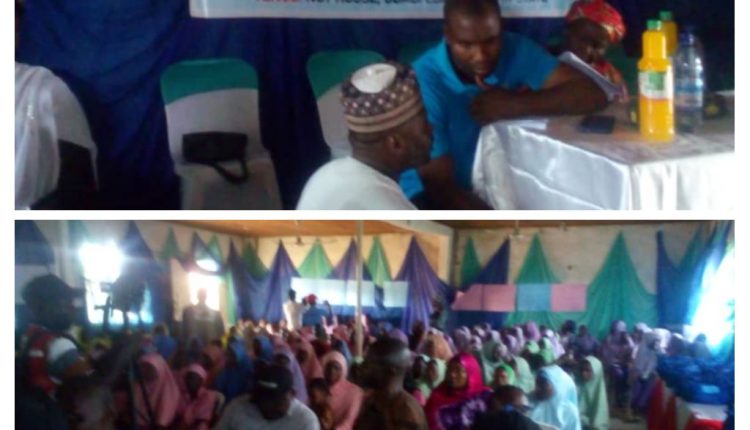From Joseph Asegba, Yola
As the year comes to an end, no fewer than 2,250 adolescence girls received menstral hygiene kits in 3 Local Government Areas in Adamawa state. The three council areas includes, Gombi, Lamurde and Madagali.
The trip led by GPE-AF project, Education Specialist, UNICEF Bauchi office, Abdulrahaman Ado said, 2,250 have been targeted for for the project.
“The monitoring and evaluation field trip by the implementing partners and government officials, in the company of journalists, to Gombi LGA, witnessed the distribution of menstrual hygiene kits to adolescent girls.
Adamawa state government, has also vowed to sustain the Accelerated Basic Education Program (ABEP). meant for addressing the challenge of out-of-school children bedeviling most states in the country.
Speaking, the Commissioner for Education and Human Services Department, Garba Pella, gave the commitment during a sustainability assurance interface between the UNICEF officials, Ministry of Education officials, experts, and media practitioners in Yola, as part of wrap-up activities for the Global Partnership in Education (GPE-AF) project in the state.
The Commissioner, represented by the Permanent Secretary of the Ministry, Hajiya Aishag Umar, Garba Pella, expressed gratitude to the implementing partners, stressing that the program has created a window for the children who dropped out of school, to have another opportunity to continue their education pursuit through both formal and non-formal arrangements.
He assured that, Governor Ahmadu Umaru Fintiri’s administration, is solidly keen on its responsibility, especially in the education sector, which is the bedrock of all developments, pledging to ensure the program continues in all the 123 learning centres formed across the three pilot local government areas, including Gombi, Lamurde, and Madagali.
The Commissioner further stated that the project of Sangaya and Early Children Education (ECE), will help in reducing out-of-school children. Likewise, funding would not affect the sustainability of the project, asserting that the Ministry’s budgetary allocations would no doubt accommodate the expenditures associated with facilitation of the program in the state.
In his presentation on the state’s GPE-AF planned and achieved results, Godwin Lucky, the Ministry of Education Unicef focal person, explained that when the program was introduced last year, the state government targeted 7,200 learners but was able to realise 12,000 learners accessing the Accelerated Basic Education Program (ABEP) in the three pilot local councils.
Lucky declared that the back-to-school campaign conducted by the Ministry, its implementing partners, with the support of traditional and religious leaders, added enrollments of more learners into formal and non-formal schools, highlighting that 48 schools were targeted for the GPE project in the three LGAs.
Some of the challenges faced during the program he said, include: anticipation of cash disbursement by members of the community, especially in out-of-school children, and enrollment of learners into the Accelerated Basic Education Program (ABEP), inadequate monitoring at the community level by the state and local government area teams and flood.
Lucky recommended that there is a need to develop a clear strategy for ownership and sustainability of the program at the community level, to strengthen supply chain planning ensuring timely procurement and delivery of kits and materials, among others.
Delivering his lecture earlier on an overview of the GPE project, Education Specialist, UNICEF Bauchi Field Office, Dr Abdulrahman Ado announced that the GPE-AF project is being implemented in three (3) states of the North East region, including Adamawa, Borno, and Yobe, with a view to creating sound education sector.
The Bauchi Field Officer specialist, maintained that the cardinal point of the project are to provide access to safe and inclusive education continuity, inclusive quality crisis-responsive learning and skills development (Recovery in medium term), and resilience initiatives for education systems and feed back.
He maintained that, “the programme targets children of five (5) to fourteen (14) years of age who are out of school. As the program commenced around July/August 2024 and will be ending by 30th September 2025 in Adamawa state, that there would be no room for extension however, urging the state government to do all it takes to ensure continuity of the program for the betterment of all the people in Adamawa.”






